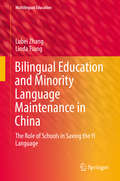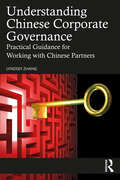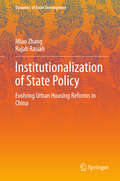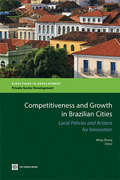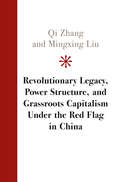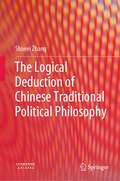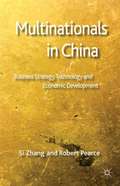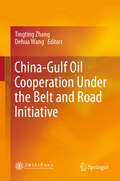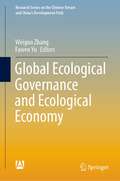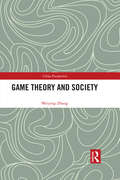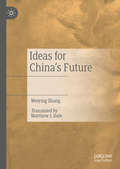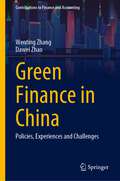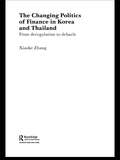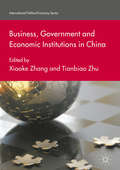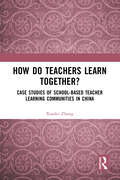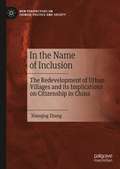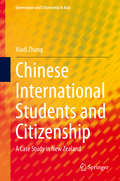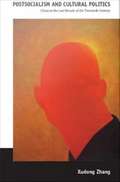- Table View
- List View
Inside China's Automobile Factories
by Lu ZhangIn Inside China's Automobile Factories, Lu Zhang explores the current conditions, subjectivity, and collective actions of autoworkers in the world's largest and fastest-growing automobile manufacturing nation. Based on years of fieldwork and extensive interviews conducted at seven large auto factories in various regions of China, Zhang provides an inside look at the daily factory life of autoworkers and a deeper understanding of the roots of rising labor unrest in the auto industry. Combining original empirical data and sophisticated analysis that moves from the shop floor to national political economy and global industry dynamics, the book develops a multilayered framework for understanding how labor relations in the auto industry and broader social economy can be expected to develop in China in the coming decades.
Bilingual Education and Minority Language Maintenance in China: The Role of Schools in Saving the Yi Language (Multilingual Education #31)
by Lubei Zhang Linda TsungThis book looks closely at Yi bilingual education practice in the southwest of China from an educationalist’s perspective and, in doing so, provides an insight toward our understanding of minority language maintenance and bilingual education implementation in China. The book provides an overview on the Yi people since 1949, their history, society, culture, customs and languages. Adopting the theory of language ecology, data was collected among different Yi groups and case studies were focused on Yi bilingual schools. By looking into the application of the Chinese government’s multilingual language and education policy over the last 30 years with its underlying language ideology and practices the book reveals the de facto language policy by analyzing the language management at school level, the linguistic landscape around the Yi community, as well as the language attitude and cultural identities held by present Yi students, teachers and parents. The book is relevant for anyone looking to more deeply understand bilingual education and language maintenance in today’s global context.
Understanding Chinese Corporate Governance: Practical Guidance for Working with Chinese Partners
by Lyndsey ZhangIn a complex political and environmental global landscape, it has never been more critical for global organizations to understand the past, present, and future of Chinese corporate governance: this book is the key. Leveraging her dual-cultural background and using a board-level practitioner’s lens, Lyndsey Zhang offers insights that will help the global business community better understand Chinese companies’ corporate governance practices and economic development journeys, shorten the learning curve for global business leaders and investors, and explore different economic models that better suit emerging markets. She addresses important questions such as: • How does the Chinese government manage to retain its controlling position in Chinese companies while still making them attractive to global investors? • What are the drivers for Chinese companies’ future corporate governance improvement? • What is China’s position on the worldwide ESG and climate change movements? • How can global practitioners feel less like "navigating in the dark" when working with Chinese companies? This book will be an invaluable resource for anyone seeking to understand the rapidly changing world of Chinese corporate governance, including global investors, senior executives in multinational corporations, consultants, financial and political policymakers, business and law students, and researchers.
China's Poor Regions: Rural-Urban Migration, Poverty, Economic Reform and Urbanisation (Routledge Studies on the Chinese Economy #Vol. 4)
by Mei ZhangThe number of poor people in China is huge, despite recent economic advances. This book investigates the problem of poverty in China's regions, discussing in particular the role of rural-urban migration in reducing poverty. It surveys the distribution and characteristics of poverty, examines anti-poverty initiatives by the Chinese government and includes the results of original research conducted in Shanxi, a typical province in Central China.
Institutionalization of State Policy
by Miao Zhang Rajah RasiahUsing fresh evidence and a novel methodological framework, this book sheds light on how institutions have driven economic reform in China's urban housing sector. The book systematically analyzes the developmental role of the state in China, with rich empirical evidence to show how decentralization has brought about significant participation by the different levels of government with the central, provincial and municipal governments focusing on initiation, intermediation and implementation roles respectively. Despite many Western analysts claiming that it is single complex superstructure, the institutionalization of governance structures in China following reforms has taken place through strong coordination between governments at different levels to meet targeted plans. Although China still has a long way to go to before it can be considered developed, this book elaborates on how the country offers a unique alternative for other states seeking to develop by striking a balance between capitalist and socialist instruments.
Competitiveness and Growth in Brazilian Cities: Local Policies and Actions for Innovation
by Ming Zhang'Competitiveness and Growth in Brazilian Cities' addresses the question of what cities can do to improve economic performance and create jobs. The topic is explored through a review of theories and policy options for city competitiveness, preliminary benchmarking of Brazilian cities, and case studies of two urban areas in Northeast Brazil-the Cariri region, Ceará and São Luís, Maranhão. The book concludes that to be competitive, cities need to reduce the cost of doing business by improving their services and infrastructure and by reducing bureaucracies. But for a middle-income country such as Brazil, which needs to be economically competitive in a globalized environment, this is not sufficient. Cities also need to add value to local businesses. A crucial part of their strategy should be to create and sustain an environment that stimulates local firms to innovate and learn from each other, to nurture the creation of synergies generated by the interconnected economic clusters in the city, and to provide incentives for all local players to continuously upgrade their level of competitiveness. With regard to local policy actions, this book highlights the cluster approach to competitiveness, with its focus on facilitating private-sector collaborations for collective efficiency. 'Competitiveness and Growth in Brazilian Cities' provides many examples of actions that may be undertaken at the local level, emphasizing the critical importance for cities to pursue a unique strategy based on their comparative and competitive advantages.
Rentz's Student Affairs Practice in Higher Education
by Naijian Zhang AssociatesThe mission of this new fourth edition is to provide the reader with a solid foundation in the historical and philosophical perspectives of college student affairs development; assist the reader in understanding the major concepts and purpose of student affairs' practice, methods, and program models; enable the reader to conceptualize the theme, or the fundamental framework of student affairs administration, its roles and functions in higher education; start the new professional on the journey toward skilled student affairs practice; and facilitate the reader's comprehension of the trends and issues of each respective division of student affairs in higher education. <P> Student affairs administrators will find the 14 chapters in the book, six of which are completely rewritten, very helpful in furthering their understanding of major functions in the field. The first two chapters provide the philosophical and historical tools to clarify assumptions, values, and concerns. The enrollment management chapters on admissions, financial aid, academic advising, and orientation interweave conceptually into one package loosely constructed at some institutions and tightly constructed at others. Residence life, orientation, judicial affairs, career services, student activities, financial aid, and multicultural affairs provide an interesting, united focus on learning and living skills. Chapters on counseling, career services, and health services focus on an integrated, wellness orientation to life. The final chapter examines social justice, student learning, and professionalism. <P> This outstanding text has been designed for both master's and doctoral-level students completing graduate courses in the areas of college student personnel, student affairs, student development, higher education administration, and student affairs counseling. The book is also designed to assist practitioners who may not have sufficient background knowledge in these fields and student affairs professionals who may use the book for continuing professional development.
Revolutionary Legacy, Power Structure, and Grassroots Capitalism Under the Red Flag in China
by Qi Zhang Mingxing LiuWhy do political elites in authoritarian regimes, even within the same country, engage in different levels of predatory behavior, whereby some foster vibrant capitalism and others suffocate the innovative private sector? This book proposes a theory of localized property-rights protection under authoritarianism. By combining in-depth fieldwork with archival research and quantitative data analysis, Qi Zhang and Mingxing Liu discuss the post-1949 conflicts between dominant and marginalized factions in the Chinese province of Zhejiang. These conflicts resulted in systemic vulnerabilities among the marginalized local cadres, thus motivating them to form alliances with their grassroots constituents. They therefore provided their constituents with quasi-public goods, such as property-rights protection, to increase their odds of political survival. Zhang and Liu argue that this framework can apply both to the Mao era and to the current reform era, and it also can be extended beyond China to a wider context.
The Logical Deduction of Chinese Traditional Political Philosophy
by Shiwei ZhangThis book presents a panoramic and extensive exploration of Chinese political philosophy, examining key political problems of the past, and the thinkers who addressed them. As the reader will discover, China’s traditional political philosophy is one with distinctive national characteristics and ideals. Therefore, the book helps to clarify the evolution of Chinese political thought, while also investigating fundamental political issues throughout the country’s history. The book offers a unique resource for researchers and graduate students in the fields of political science, philosophy, and history, as well as ordinary readers who are interested in China’s traditional and political culture.
Chinese War Correspondents: Covering Wars and Conflicts in the Twenty-First Century (Palgrave Series in Asia and Pacific Studies)
by Shixin Ivy ZhangThis book engages with the Chinese mediation of wars and conflicts in the global environment.Proposing a new cascading media and conflict model, it applies this to the studyof war correspondents from six levels: media-policy relations, journalistic objectivity, roleperceptions, news framing and peace/war journalism, news practices, and audience.Based on interviews with 23 Chinese journalists and case study analysis of the Libyan War,Syrian War, Afghanistan War and Israeli-Palestinian conflict, the book demonstrates thata new breed of Chinese war correspondents has emerged today. They undergo a complexand nuanced mediated communication process. Neither traditionally Chinese in theirapproach nor western in their perceptions, they are uniquely pragmatic in negotiating theirroles in a complex web of internal and external actors and factors. The core ideology seemsto be anti-West in defiance of the US hegemony and the bias of global media as well asneutral-Muslims.Exploring the role perceptions, values, norms and practices of contemporary Chinese warcorrespondents who go outside China to bring the ‘distant culture’ back home, this text is keyreading for scholars and students in international journalism, international communication,war and peace studies, international relations and Chinese studies.
Multinationals in China
by Si Zhang Robert PearceMultinationals, China and the Global Economy analyses the results of an in-depth survey of subsidiaries in China of leading manufacturing multinational enterprises (MNEs). It investigates the strategic roles played by these subsidiaries and the sources of technologies they access or generate in doing this. It provides an original contribution to the understanding of important issues in international business, the economic development of China and economics. In international business this study extends our knowledge of MNEs' global strategies through detailed analysis of the precise roles they expect their subsidiaries in China to play. A central theme of this is how these roles relate to the development of the Chinese economy and help its positioning in the global economy. Using the results of their survey, the authors analyse how MNEs are operating within the reorientation of Chinese development from low-cost exporting to an innovation-oriented and knowledge-driven economy. A very distinctive response to the growing Chinese market, and its changing patterns of consumer demand, emerges as a crucial factor at the core of this.
China-Gulf Oil Cooperation Under the Belt and Road Initiative
by Tingting Zhang Dehua WangThis book not only discusses how to further deepen the oil cooperation relations between China and the Gulf Council Countries in the context of “the Belt and Road Initiative”, but also investigates how to ensure the security of the entire oil supply chain including oil supply, oil transportation channels, oil demand, and petroleum reserves in China. Further, it examines a novel, win-win oil cooperation between China and the GCC countries, known as joint oil stockpiling. The results presented offer guidance for similar energy cooperation between China and other energy producing countries and also provide a new perspective on how to improve the research on and understanding of China’s energy security issues and multi-lateral energy cooperation issues, making the book of particular interest to engineers and scientists in the field of energy, international relations, and oil stockpiling enterprises.
Global Ecological Governance and Ecological Economy (Research Series on the Chinese Dream and China’s Development Path)
by Weiguo Zhang Fawen YuThis book focuses on ecological economics conducted in the context of global ecological governance, covering topics from ecological footprint, energy saving and emission reduction, circular economy, green development, sustainable development, ecological civilization, to the ecological environment and ecological governance of rural areas, etc. as well as some theoretical studies related to efficient ecological economics. It is contributed by scholars attending the high-level forum with the theme of “Global Ecological Governance and Ecological Economic Studies” hosted by the Chinese Ecological Economics Society (CEES), the first ecological economics society in the world, and many cutting-edge concepts in the field of ecological economics are proposed. It provides some insight for scholars who are interested in the field of global ecological governance and ecological economic studies.
Game Theory and Society (China Perspectives)
by Weiying ZhangThe progress of society can only happen through interpersonal cooperation, because only cooperation can bring about mutual benefit, thus bringing happiness to each person. This should be our collective rationality, but we often see it conflicts with individual interests, which leads to the so-called "Prisoners’ Dilemma" and does not bring happiness to all. From a game theoretical perspective, this book addresses the issue of how people can cooperate better. It has two objectives. The first is to use common language to systematically introduce the basic methodologies and core conclusions of Game Theory, including the Nash equilibrium, multiple equilibriums, dynamic games, etc. Mathematics and theoretical models are used to the minimum necessary scope too, to make this book get access to ordinary readers with elementary mathematical training. The second objective is to utilize these methods and conclusions to analyze various Chinese social issues and institutional arrangements, with a focus on the reasons people exhibit non-cooperative behaviors as well as the institutions and cultures that promote interpersonal cooperation. In addition to economics, specialists in sociology, law, history, politics and management will also be attracted by this book for its insightful analysis on the issue of cooperation in these fields. Also, readers curious about Chinese society will benefit from this book.
Ideas for China’s Future
by Weiying ZhangThis book attempts to convey that ideas matter and China needs right ideas to defeat wrong ideas and to guide its future reform. The successes that China has accomplished over the last 40 years of reform and opening were the result of ideas defeating interests. After the end of the “Cultural Revolution,” Deng Xiaoping initiated market-oriented Reform and Opening because he had new ideas. While China has made great progress in both economic and social development since the beginning of reform and opening, there is still a long way to go to become a liberal society. Although the ideas of political leaders are crucial in the short term for social transformation to take place, the ideas of the common people play a more important role in the long term. The types of new ideas that China needs are proposed in this book.
Chinese Conceptions of Democratic Education: Ethnographic Insights and Classroom Practice (Critical Global Citizenship Education)
by Wenchao ZhangThis book draws on a rich ethnographic study to examine Chinese democracy and its practices in democratic education.As the first book to interrogate practices of democratic education from an insider perspective, it offers a unique model of Chinese democratic education based in school practices. It illuminates connections between the school practices of Chinese democratic education, the Chinese democratic system and the effects of globalizations. As such, it analyses the particular ways in which educators can and must balance global needs and local cultures. Ultimately arguing that comprehension of Chinese democracy and its educational practices should take root in the specific social and cultural context in which it was developed, it advocates that a more comprehensive understanding of democracy and democratic education can be achieved. Building on this premise, it outlines ways to guide enhanced critical analysis and cultivate mutual cultural respect, thereby contributing to the pursuit of a more peaceful world. Drawing on rich and detailed narratives, dialogue, observation, and reflexivity, the author successfully situates the Chinese experience within a global landscape and challenges the mainstream understanding of democracy on the global stage.Promoting tolerance of other cultures and opening up new ways of thinking from a globally diverse perspective, it will appeal to researchers, postgraduate students and educators with interests in global citizenship education, social studies education, democracy, and international education.
Green Finance in China: Policies, Experiences and Challenges (Contributions to Finance and Accounting)
by Wenting Zhang Dawei ZhaoThis book aims to provide first-hand information for readers concerned with green finance and sustainable development by summarizing the unique features, policies and practical innovations of green finance development in China and hoping to provide China's experience in the development of green finance for more regions. The global economy is currently facing historic opportunities that brings by a new round of technology, energy and industrial revolution. The new growth path of "green and low-carbon" development has become the main direction of the transformation of global economic development. What's China's green finance strategy? How does China deliver on the goal? This book builds an overview of China's green finance and sheds light on sustainable development topics from finance perspective.
The Changing Politics of Finance in Korea and Thailand: From Deregulation to Debacle (RIPE Series in Global Political Economy #No.8)
by Xiaoke ZhangThis is the first systematic attempt to explore the causal relationship between financial market reform and financial crisis in an interdisciplinary and comparative perspective. It examines the political underpinnings of financial policy-change and provides an in-depth analysis of market liberalisation processes and their impact on the economic turmoil of 1997-98 in Korea and Thailand. The common crisis stemmed from divergent reform patterns and originated from dissimilar institutional deficiencies and political constraints.The book will be essential reading for both policy-makers and academics concerned with national governance in an era of globalisation.
Business, Government and Economic Institutions in China (International Political Economy Series)
by Xiaoke Zhang Tianbiao ZhuThis book brings together conceptual and empirical analyses of the causes and consequences of changing business-government relations in China since the 1990s, against the backdrop of the country's increased integration with the global political economy. More specifically, it provides an interdisciplinary account of how the dominant patterns of interactions between state actors, firms and business organizations have changed across regions and industries, and how the changing varieties of these patterns have interacted with the evolution of key market institutions in China. The contributors to this edited volume posit that business-government relations comprise a key linchpin that defines the Chinese political economy and calibrates the character of its constitutive institutional arrangements.
How Do Teachers Learn Together?: Case Studies of School-based Teacher Learning Communities in China
by Xiaolei ZhangBased on case studies of Chinese teachers in Shanghai and their workplace learning within the context of reform, this book examines how Chinese teachers learn together when they engage in school-based learning activities. Since the New Curriculum Reform in China in 2001, school-based teaching research groups (TRGs) (Jiaoyanzu) have played an important role in changing teacher learning approaches. Informed by organizational learning frameworks and organizational knowledge theory, the author examines the processes and effects of teacher learning in school-based settings, particularly the role of school leadership in the learning and change of in-service teachers. Implications of sustainably optimizing the school-based teacher learning communities for school improvement are also discussed. The book will be helpful and valuable for policymakers, school leaders, researchers, students, teachers, and other educational practitioners in understanding the distinctive features of school-based teachers’ learning in China.
China's Information and Communications Technology Revolution: Social changes and state responses (China Policy Series)
by Xiaoling Zhang Yongnian ZhengIn recent years, China has experienced a revolution in information and communications technology (ICT), in 2003 surpassing the USA as the world’s largest telephone market, and as of February 2008, the number of Chinese Internet users has become the largest in the world. At the same time, China has overtaken the USA as the world’s biggest supplier of information technology goods. However, this transformation has occurred against the backdrop of a resolutely authoritarian political system and strict censorship by the Party-state. This book examines China’s ICT revolution, exploring the social, cultural and political implications of China’s transition to a more information-rich and communication-intensive society. The pace of the development of ICT in China has precipitated much speculation about political change and democratisation. This book explores the reality of ICT in China, showing clearly that whilst China remains a one-party state, with an ever-present and sophisticated regime of censorship, substantial social and political changes have taken place. It considers the ICT revolution in all its aspects, outlining the dominant trends, the impact on other countries of China as an ICT exporter, strategies of government censorship and use of ICT for propaganda, the implications of censorship for Chinese governance, the political implications of internet culture and blogging, and the role of domestic and foreign NGOs. Overall, this book is a vital resource for anyone seeking to understand a rapidly transforming China, both today and in the years to come.
In the Name of Inclusion: The Redevelopment of Urban Villages and its Implications on Citizenship in China (New Perspectives on Chinese Politics and Society)
by Xiaoqing ZhangThis book follows the citizenship-based approach and interrogates the policies on urban village redevelopment from a perspective of social exclusion and inclusion. It focuses on two questions: how policy makers and urban villagers understand social inclusion differently, and what makes a difference in enhancing social inclusion. Firstly, an examination of citizenship conceptions, as reflected in the Chinese traditional discourses, provides the basis for questioning the political rhetoric of social inclusion in China. Secondly, a comparison between policy makers’ and villages’ interpretations on urban citizenship helps explore the different understandings of citizenship between them. Finally, by studying six redeveloped urban villages in the city of Xi’an, the book identifies what villagers strive for, and discusses how their strivings make a difference in achieving social inclusion during urban village redevelopment.
The Global in the Local: A Century of War, Commerce, and Technology in China
by Xin ZhangThe story of globalization in the nineteenth and early twentieth centuries as experienced by ordinary people in the Chinese river town of Zhenjiang.Fear swept Zhenjiang as British soldiers gathered outside the city walls in the summer of 1842. Already suspicious of foreigners, locals had also heard of the suffering the British inflicted two months earlier, in Zhapu. A wave of suicides and mercy killings ensued: rather than leave their families to the invaders, hundreds of women killed themselves and their children or died at the hands of male family members. British observers decried an “Asian culture” of ritual suicide. In reality, the event was sui generis—a tragic result of colliding local and global forces in nineteenth-century China.Xin Zhang’s groundbreaking history examines the intense negotiations between local societies and global changes that created modern China. In the nineteenth and early twentieth centuries, world-historic political, economic, and technological developments transformed the textures of everyday life in places like Zhenjiang, a midsize river town in China’s prosperous Lower Yangzi region. Drawing on rare primary sources, including handwritten diaries and other personal writings, Zhang offers a ground-level view of globalization in the city. We see civilians coping with the traumatic international encounters of the Opium War; Zhenjiang brokers bankrolling Shanghai’s ascendance as a cosmopolitan commercial hub; and merchants shipping goods to market, for the first time, on steamships.Far from passive recipients, the Chinese leveraged, resisted, and made change for themselves. Indeed, The Global in the Local argues that globalization is inevitably refracted through local particularities.
Chinese International Students and Citizenship: A Case Study in New Zealand (Governance and Citizenship in Asia)
by Xiudi ZhangThis book investigates how Chinese international students reconfigure their sense of themselves as citizens when they reflect on what Chinese citizenship means in the context of New Zealand. Adopting a case study approach, it develops a theory relating to the thoughts of Chinese international students; the theory is based on the communities, schools, family and state relationships of both their past and their contemporary daily experiences. It finds that the struggles of Chinese young people lie in between being individuals and submitting to the general will of the family, state and guanxi (a Chinese concept of interpersonal relationships). The book argues that the Western literature on citizenship is not sufficient in helping us understand how it is viewed in the Chinese contexts.It offers readers a picture of what citizenship means for Chinese young people and the role of citizenship education in Modern Chinese society, and demonstrates that the Chinese young people studied re-educated themselves on citizenship in a way that is unstable and emotional. This book makes important contributions to the literature on Chinese students who are studying abroad by going beyond the well-researched topics of academic and social experience to explore deeper understandings of each individual student’s relationship to family and the state in China and how the study abroad experience has developed new understandings of individual’s relationships to China, and new possibilities for contributing to Chinese society on return.
Postsocialism and Cultural Politics: China in the Last Decade of the Twentieth Century
by Xudong ZhangIn Postsocialism and Cultural Politics, Xudong Zhang offers a critical analysis of China's "long 1990s," the tumultuous years between the 1989 Tiananmen Square crackdown and China's entry into the World Trade Organization in 2001. The 1990s were marked by Deng Xiaoping's market-oriented reforms, the Taiwan missile crisis, the Asian financial crisis, and the end of British colonial rule of Hong Kong. Considering developments including the state's cultivation of a market economy, the aggressive neoliberalism that accompanied that effort, the rise of a middle class and a consumer culture, and China's entry into the world economy, Zhang argues that Chinese socialism is not over. Rather it survives as postsocialism, which is articulated through the discourses of postmodernism and nationalism and through the co-existence of multiple modes of production and socio-cultural norms. Highlighting China's uniqueness, as well as the implications of its recent experiences for the wider world, Zhang suggests that Chinese postsocialism illuminates previously obscure aspects of the global shift from modernity to postmodernity. Zhang examines the reactions of intellectuals, authors, and filmmakers to the cultural and political conflicts in China during the 1990s. He offers a nuanced assessment of the changing divisions and allegiances within the intellectual landscape, and he analyzes the postsocialist realism of the era through readings of Mo Yan's fiction and the films of Zhang Yimou. With Postsocialism and Cultural Politics, Zhang applies the same keen insight to China's long 1990s that he brought to bear on the 1980s in Chinese Modernism in the Era of Reforms.

